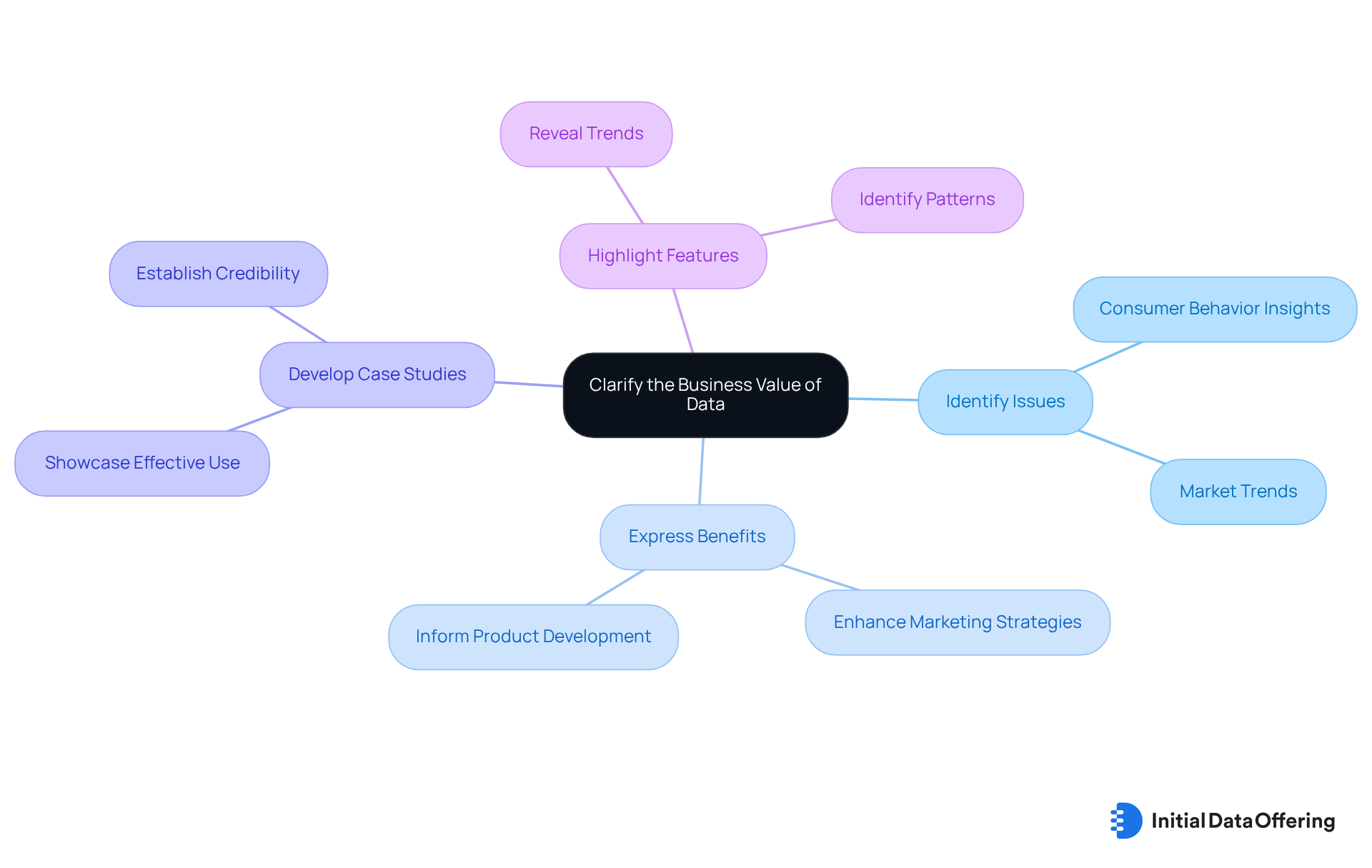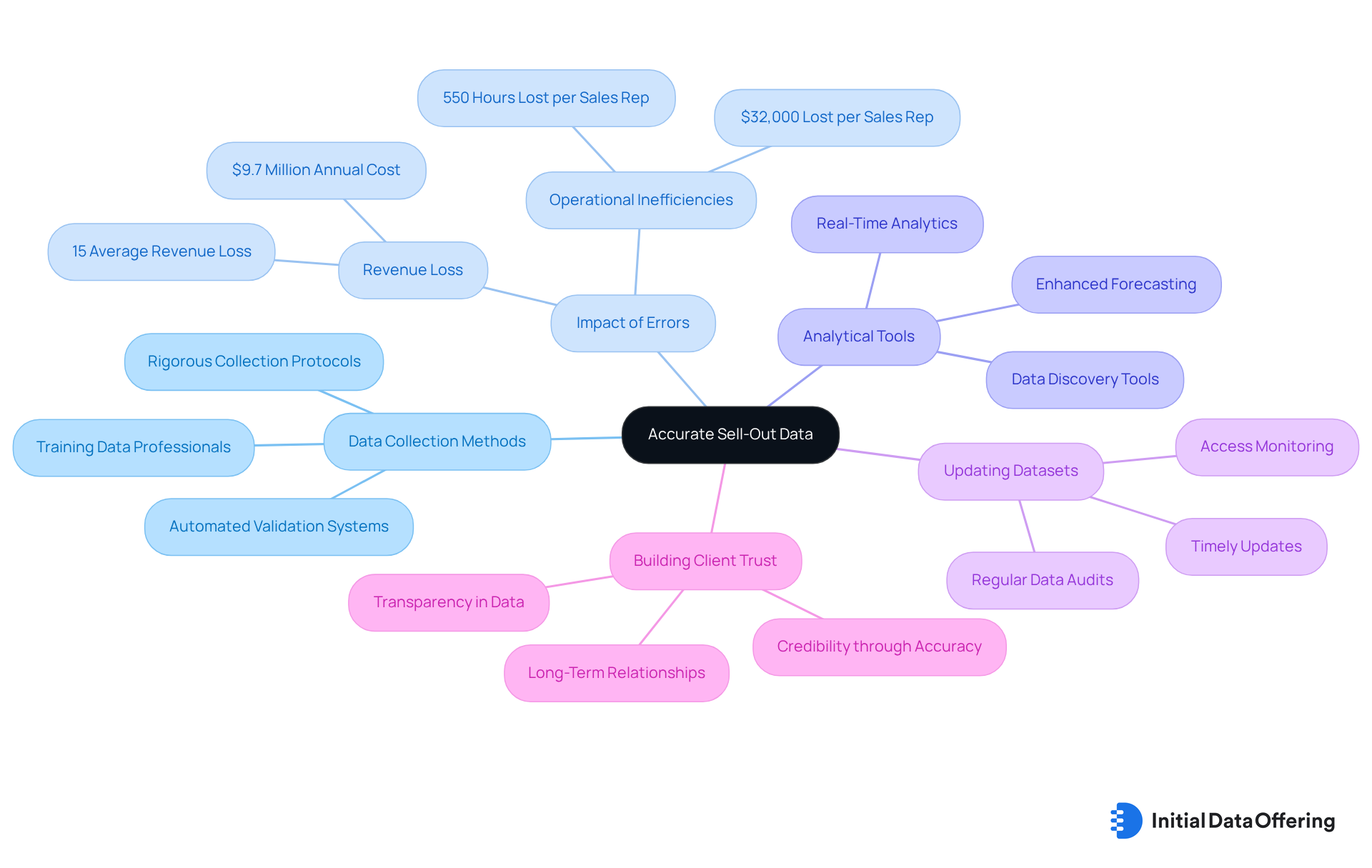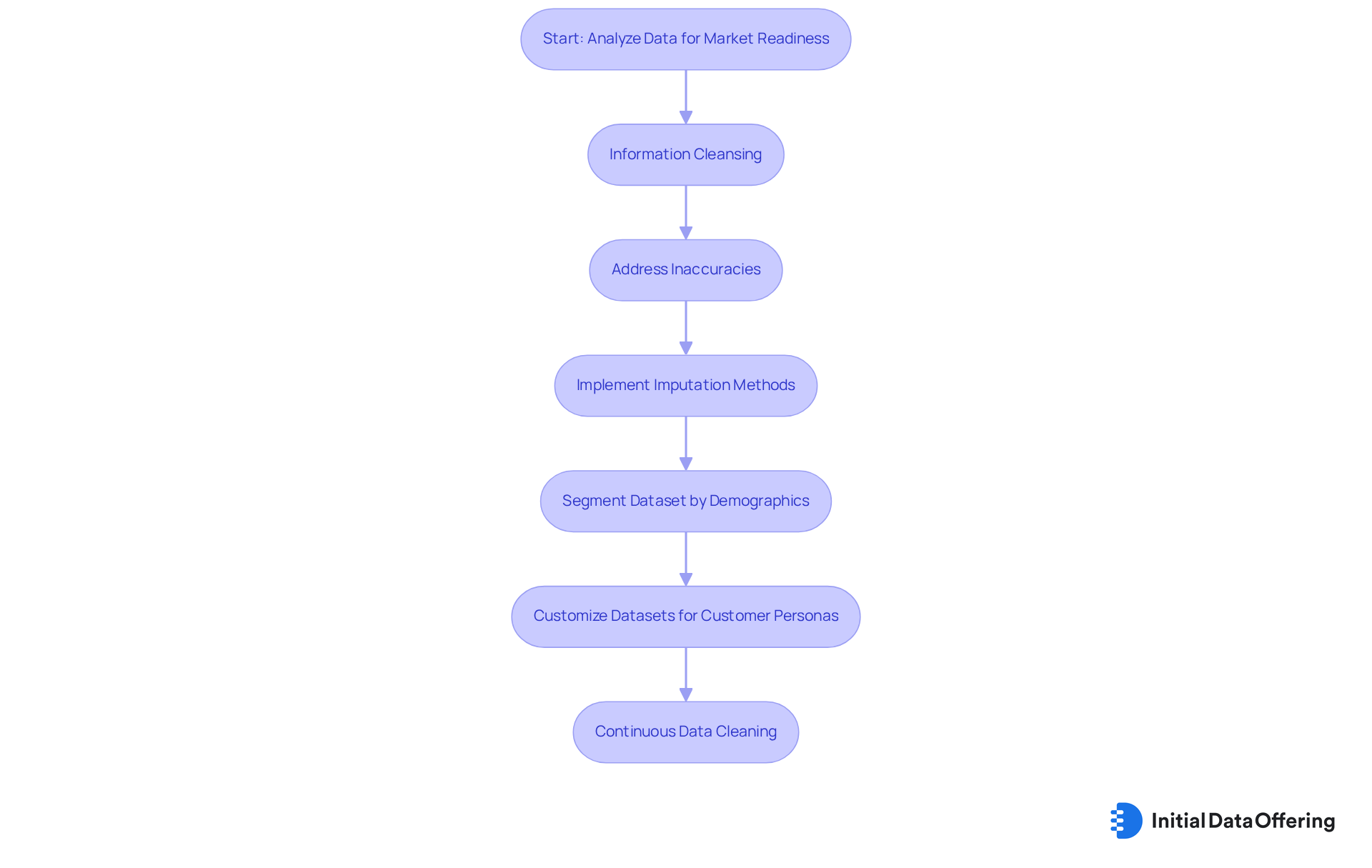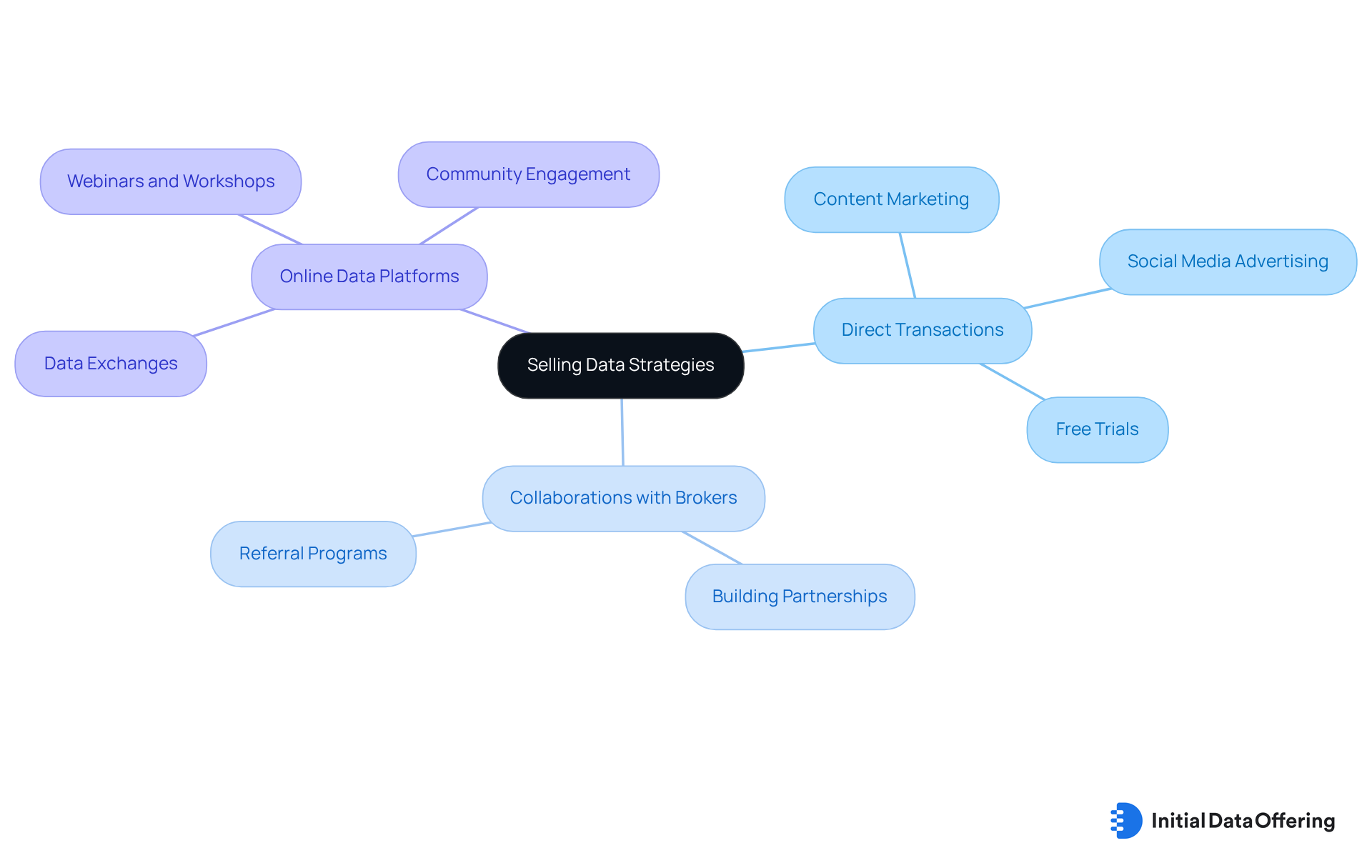4 Key Practices for Selling of Data Effectively

4 Key Practices for Selling of Data Effectively
Overview
The article outlines four key practices for effectively selling data. These include:
- Clarifying the business value of data
- Acquiring accurate sell-out data
- Analyzing and refining data for market readiness
- Exploring diverse selling methods
Each practice emphasizes precision, credibility, and tailored marketing strategies. These elements enhance the appeal of data offerings and foster trust with potential buyers. Ultimately, this approach leads to better sales outcomes.
By clarifying the business value of data, sellers can effectively communicate its relevance to potential buyers. This practice not only highlights the data's features but also showcases the advantages it offers in decision-making processes. Acquiring accurate sell-out data is crucial, as it ensures that the information presented is credible and reliable. This credibility is vital for establishing trust, which is a cornerstone of successful sales.
Furthermore, analyzing and refining data for market readiness allows sellers to present their offerings in the best possible light. This practice involves tailoring the data to meet the specific needs of the market, thereby maximizing its appeal. Exploring diverse selling methods can also broaden the reach of data offerings, making them accessible to a wider audience.
In conclusion, these practices collectively enhance the effectiveness of data selling. By focusing on precision and credibility, sellers can build trust with potential buyers, ultimately leading to improved sales outcomes.
Introduction
In an increasingly data-driven world, the ability to effectively sell data has emerged as a critical skill for vendors aiming to thrive in a competitive marketplace. Understanding the business value of their datasets is essential; by employing precise data management practices, sellers can unlock significant opportunities for growth. However, the challenge lies not only in presenting data but in transforming it into a compelling narrative that resonates with potential buyers.
How can organizations refine their approach to data selling? This involves ensuring they meet market demands while fostering trust and credibility.
Clarify the Business Value of Data
To effectively market information, vendors must first clarify its business value. This involves identifying the specific issues that the information can resolve for potential buyers. For instance, if a dataset offers insights into consumer behavior, vendors should express how these insights can enhance marketing strategies or inform product development. Furthermore, vendors should consider developing case studies or endorsements that showcase the effective use of their information in practical contexts. This not only establishes credibility but also assists potential buyers in envisioning the practical advantages of the information they are assessing.
What specific challenges can your dataset address? By clearly articulating the features of the dataset, such as its ability to reveal trends or patterns, vendors can highlight its advantages. These advantages translate into tangible benefits for potential buyers, facilitating informed decision-making. In doing so, vendors create a narrative that resonates with the needs of their audience, ultimately fostering a deeper understanding of the dataset's value.

Acquire Accurate Sell-Out Data
To ensure precise sell-out information, sellers must adopt rigorous collection methods that prioritize integrity and reliability. The feature of precise data collection is crucial, as companies lose an average of 15% of their revenue due to erroneous information. This underscores the critical need for precision in information management, highlighting the advantage of adopting sophisticated analytical tools.
For instance, employing automated validation systems can greatly improve the monitoring of trends and consumer behavior, offering deeper insights into market dynamics. The benefit of such tools is evident: they enhance precision by up to 35%, ultimately fostering better decision-making.
Regularly updating datasets is essential; outdated sales figures can mislead potential buyers regarding current market conditions. By ensuring that the information supplied is both precise and prompt, vendors can establish trust with their clients. This dedication to information quality not only boosts credibility but also nurtures long-term connections and promotes repeat trade.
In a competitive marketplace, sellers who prioritize accurate information position themselves as trustworthy sources, enhancing the return on investment in market research. How might your organization benefit from implementing these practices? Consider the potential impact on your relationships with clients and overall market positioning.

Analyze and Refine Data for Market Readiness
To effectively promote information, it is essential to analyze and refine it to achieve market readiness. This process begins with thorough information cleansing, addressing inaccuracies and inconsistencies that could diminish the dataset's worth. A report indicates that 64% of organizations recognize information quality as their primary challenge, underscoring the importance of this step. Sellers should adopt systematic techniques to identify and correct errors, such as employing imputation methods for missing information, including the mean, median, or mode. This ensures that the information is valid, complete, and consistent.
For instance, consider a dataset on consumer spending habits. It can be segmented by demographics—such as age, income, or location—enabling businesses to target specific customer groups more effectively. By customizing datasets to meet the requirements of various customer personas, sellers enhance the significance and appeal of their offerings. It is also crucial to acknowledge that information cleaning is a continuous process; frequent mistakes, such as duplicate entries resulting from merging details from various sources, should be avoided.
Presenting well-analyzed and refined information not only boosts its marketability for the selling of data but also fosters trust among potential buyers. This trust ultimately leads to more successful transactions. How might your organization benefit from implementing these data cleansing strategies? By ensuring the quality of your datasets, you can improve decision-making and drive better outcomes.

Explore Methods for Selling Data Effectively
To efficiently market the selling of data, vendors should investigate a range of distribution channels and techniques. This includes:
- The selling of data through direct transactions in dedicated marketplaces
- Collaborations with data brokers
- The use of online platforms that focus on data exchanges
Digital marketing strategies are crucial for reaching a broader audience; for instance, content marketing and social media advertising can significantly enhance visibility. By developing informative blog articles or conducting webinars that highlight the value of datasets, vendors can attract prospective customers. Furthermore, offering free trials or sample datasets can entice customers to make a transaction, as cultivating leads can lead to 20% more business opportunities.
By diversifying their sales methods, sellers can maximize their reach and enhance sales opportunities in the selling of data, ultimately driving better results in the competitive information marketplace. To stay informed about high-quality datasets and connect with a community of enthusiasts, consider subscribing to Initial Data Offering. This platform not only provides access to valuable datasets but also fosters connections among data professionals.
How can these strategies be integrated into your current marketing efforts to optimize results? Think about the potential benefits of engaging with a community that shares insights and innovations in data marketing.

Conclusion
To successfully navigate the complexities of selling data, it is essential to emphasize the intrinsic value that data brings to businesses. By clearly articulating how datasets can address specific challenges and enhance decision-making, vendors can create compelling narratives that resonate with potential buyers. This focus on business value not only establishes credibility but also fosters a deeper connection with the audience, making it easier for them to envision the practical benefits of the information being offered.
The article outlines four key practices that are crucial for effective data selling:
- Clarifying the business value of data
- Acquiring accurate sell-out data
- Analyzing and refining data to ensure market readiness
- Exploring diverse methods for distribution
Each of these practices plays a vital role in building trust and enhancing the appeal of the datasets. By prioritizing accuracy, consistency, and strategic marketing, vendors can significantly improve their chances of success in a competitive marketplace.
Ultimately, the significance of these practices extends beyond mere transactions; they form the foundation of sustainable business relationships and informed decision-making. Embracing these strategies not only elevates the quality of data offerings but also positions vendors as trusted partners in the data-driven landscape. Organizations are encouraged to reflect on how implementing these best practices can transform their approach to data sales, leading to improved outcomes and stronger connections with clients.
Frequently Asked Questions
Why is it important for vendors to clarify the business value of data?
Clarifying the business value of data is essential for vendors as it helps identify specific issues that the information can resolve for potential buyers, making it easier for them to understand its relevance and benefits.
How can vendors demonstrate the value of their datasets?
Vendors can demonstrate the value of their datasets by expressing how insights can enhance marketing strategies or inform product development. They can also develop case studies or endorsements to showcase effective use in practical contexts.
What should vendors highlight about their datasets to attract buyers?
Vendors should highlight the specific features of their datasets, such as the ability to reveal trends or patterns, and articulate the tangible benefits these features provide to potential buyers.
How do case studies and endorsements benefit vendors?
Case studies and endorsements establish credibility for vendors and assist potential buyers in envisioning the practical advantages of the information being assessed.
What is the ultimate goal of vendors when marketing their datasets?
The ultimate goal is to create a narrative that resonates with the needs of their audience, fostering a deeper understanding of the dataset's value and facilitating informed decision-making.